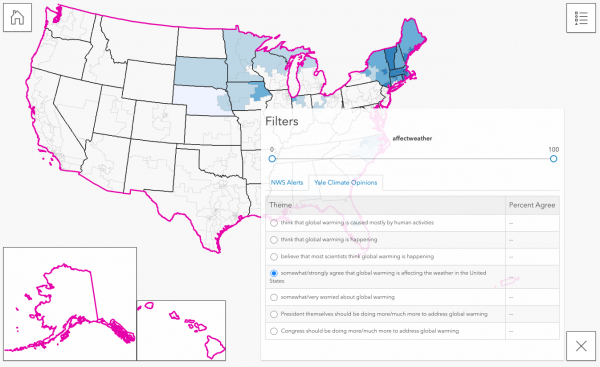
In February of 2020, just before Campus shifted to remote work, an interdisciplinary group formed to learn about creating web mapping applications using the ArcGIS API for JavaScript.
The idea: work on a project that meets the needs of a researcher, but also provides an opportunity to share and grow knowledge across teams, in turn allowing us to better serve those at the university. Professor Perry Sampson had a project proposal in mind to create a web mapping application to link severe weather events with public opinion on climate change. In the end, the group would produce a minimal viable product to demonstrate the capabilities of the ArcGIS API for JavaScript.
The group included Geographic Information Systems (GIS) specialists from LSA Technology Services, School of Public Health, Matthaei Botanical Gardens and Nichols Arboretum, and the Clark Library. The team gathered on a biweekly basis to learn how to set up a web server, create web pages, and implement interactive maps and widgets through the ArcGIS API for JavaScript.
In March, as much of the university community shifted to remote work, this regular meeting time took on the additional purpose of keeping folks connected when it seemed easier to slip into departmental silos.
Throughout this process, the group learned a few lessons. One challenge with collaborative learning is perhaps its greatest strength as well; the fact that members come with different backgrounds and skillsets. To bridge gaps between skills, members paired up to work on specific tasks during the days between check-ins. While this was beneficial, it could have been leveraged more throughout the project.
One of the major successes, noted by Peter Knoop (LSA Technology Services), was that “working on a common task, with folks bringing different areas of expertise to the table, was rewarding both in terms of learning new skills and producing something greater than what we could have accomplished individually.”
The group is using this model for additional professional development projects moving forward, and hope to inspire others to do the same. There is a wealth of knowledge here at the university, and setting aside just one hour a week to share expertise can have a huge benefit.
